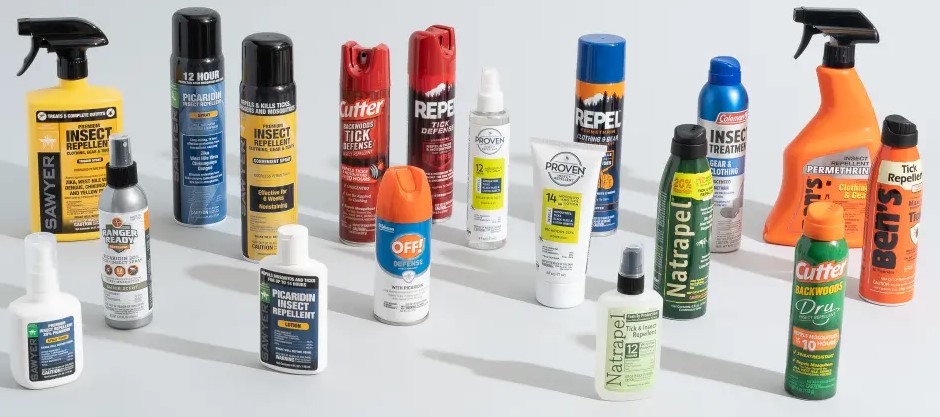Stay Bug-Free: Expert Tips for Applying Insect Repellents Correctly
Heading off for a hike? Planning a picnic in the park? Or maybe you’re just looking to enjoy some outdoor time without those pesky bugs ruining your fun. Whatever your reason, insect repellents are an essential tool to keep those buzzing and biting creatures at bay. But did you know that simply spraying on some repellent might not be enough? That’s right! To stay bug-free, it’s crucial to understand how these products work and apply them correctly. In this blog post, we’ll explore everything you need to know about insect repellents from their effectiveness and safety considerations to choosing the right one for your needs and applying them properly. So grab your bug spray and let’s dive in!
Understanding Insect Repellents
When it comes to keeping those pesky bugs away, understanding how insect repellents work is key. These magical potions create a shield between you and the insects, deterring them from landing on your skin or biting you. But just spraying any old repellent won’t do the trick! It’s important to know which ones are effective and safe for use.
Insect repellents contain specific active ingredients that ward off bugs. These ingredients either confuse the insects’ senses or repel them altogether. For example, synthetic repellents like DEET and picaridin interfere with the bugs’ ability to detect human scent, making us less attractive targets. Natural repellents such as citronella oil or lemon eucalyptus work by masking our scent or irritating the insects, discouraging them from coming close. So before picking up a bottle of bug spray, let’s dive deeper into their effectiveness and safety considerations!
Effectiveness of Insect Repellents
When it comes to insect repellents, effectiveness is key. After all, the whole point of using these products is to keep those pesky bugs away! But just how effective are they?
Well, the good news is that insect repellents can be highly effective in keeping insects at bay. They work by creating a barrier between you and the bugs, making it less likely for them to land on your skin or bite you. The active ingredients in repellents repel insects by either masking your scent or interfering with their sensory receptors.
However, it’s important to note that the effectiveness of insect repellents can vary depending on factors such as the type of bug you’re trying to repel and the concentration of active ingredients in the product. It’s always a good idea to choose a repellent that specifically targets the types of insects you’ll encounter in your area.
Remember, while insect repellents can be highly effective in deterring bugs, no product can guarantee 100% protection. It’s still important to take other preventative measures such as wearing long sleeves and pants when outdoors during peak mosquito activity times and removing standing water around your home where mosquitoes breed.
So if you want maximum protection against those buzzing nuisances, make sure to choose an effective insect repellent and use it correctly according to label instructions. Stay bug-free this summer!
Safety Considerations for Using Insect Repellents
When it comes to using insect repellents, safety should always be a top priority. While these products are designed to keep bugs away, they can also pose risks if not used correctly. Here are some important safety considerations to keep in mind:
First and foremost, read the instructions carefully before applying any insect repellent. Different products may have different guidelines for usage and application methods. It’s essential to follow these instructions to ensure maximum effectiveness and minimize any potential harm.
In addition, it’s crucial to avoid applying insect repellents on broken or irritated skin. This can increase the absorption of chemicals into the body and potentially cause irritation or other adverse reactions. When using sprays or lotions, make sure to apply them evenly and avoid contact with eyes, mouth, or open wounds. By taking these safety precautions into account, you can enjoy bug-free outdoor adventures without compromising your well-being
Choosing the Right Insect Repellent
Choosing the right insect repellent is essential for staying bug-free during outdoor activities. With so many options available, it can be overwhelming to know which one to choose. Synthetic insect repellents are a common choice, containing ingredients like DEET or picaridin that effectively repel mosquitoes and ticks. On the other hand, natural insect repellents made from plant-based oils like citronella or lemon eucalyptus provide an alternative option for those seeking more natural solutions.
When selecting an insect repellent, consider factors such as the duration of protection needed and the level of bug activity in your area. For shorter outings or low-risk situations, a lower concentration of active ingredients may suffice. However, if you’re planning on spending extended periods outdoors or visiting areas with high pest populations, opt for a higher concentration to ensure maximum effectiveness.
Remember to always read and follow the instructions on the product label carefully. Additionally, consider any personal sensitivities or allergies when choosing an insect repellent. It’s also worth exploring alternatives such as wearable devices or clothing treated with repellent for added protection.
By choosing the right insect repellent tailored to your needs and preferences, you can guard against pesky bugs while enjoying your time outdoors without interruption! Stay tuned for our next section on proper application techniques to maximize its benefits!
Common Synthetic Insect Repellents
When it comes to keeping pesky bugs at bay, synthetic insect repellents are a popular choice for many. These repellents often contain chemicals such as DEET or picaridin, which have been proven effective in repelling a wide range of insects including mosquitoes and ticks.
These synthetic options come in various forms, from lotions and sprays to wipes and gels. They provide long-lasting protection against those annoying bites that can ruin your outdoor adventures. So next time you’re planning a hike or camping trip, don’t forget to grab a bottle of the ever-reliable synthetic insect repellent!
Common Natural Insect Repellents
When it comes to keeping pesky bugs at bay, many people prefer natural alternatives to synthetic insect repellents. These natural options not only provide protection but also offer a more eco-friendly approach. Let’s explore some common natural insect repellents that can help you stay bug-free this season.
One popular choice is citronella oil. Derived from the leaves of the lemongrass plant, citronella has long been used as a natural mosquito deterrent. Its distinct aroma masks the scents that attract mosquitoes, making it an effective and pleasant-smelling option for outdoor activities. Another natural repellent to consider is eucalyptus oil. With its strong scent and anti-mosquito properties, eucalyptus oil can be an excellent choice for repelling insects naturally.
Other commonly used natural repellents include lavender oil, peppermint oil, and tea tree oil. Lavender possesses insect-repelling properties while offering a calming fragrance, making it ideal for those looking to relax outdoors without being bothered by bugs. Peppermint provides a refreshing scent while deterring mosquitoes and other pests with its potent aroma. Tea tree oil not only helps keep insects away but also has antiseptic qualities that can soothe bites or irritations caused by them.
By opting for these common natural insect repellents, you can protect yourself from unwanted bug encounters in a safer and more environmentally friendly way!
Exploring Insect Repellents from Natural Sources
When it comes to protecting ourselves from pesky insects, many of us prefer to explore natural options. Thankfully, there are several insect repellents derived from natural sources that can effectively keep bugs at bay.
One popular option is citronella oil, which is extracted from the leaves and stems of certain plants. This aromatic oil has been used for centuries as a mosquito repellent and can be found in candles, sprays, and lotions. Another natural ingredient worth exploring is eucalyptus oil. Derived from the leaves of eucalyptus trees, this essential oil contains compounds that repel mosquitoes and other biting insects. It’s commonly found in bug sprays and lotions formulated for outdoor use.
Natural remedies like neem oil are also gaining popularity for their insect-repellent properties. Neem oil is extracted from the seeds of the neem tree and has been used in traditional Indian medicine for its antifungal and antibacterial properties. When applied topically as a spray or lotion, it acts as an effective deterrent against various pests.
Exploring these natural sources opens up a world of possibilities when it comes to finding an insect repellent that suits your preferences. Whether you opt for citronella, eucalyptus, or neem-based products, remember to read labels carefully and choose reputable brands with proven effectiveness. Stay tuned for more tips on staying bug-free!
Proper Application Techniques for Insect Repellents
When it comes to using insect repellents, applying them correctly is key to ensuring their effectiveness. Here are a few tips on how to apply insect repellents properly.
When applying insect repellent on humans, make sure to cover all exposed areas of the skin. Start by spraying or rubbing the product onto your hands and then evenly distribute it onto your body. Be careful not to apply too much in one area, as this can lead to an unpleasant sticky feeling. Remember to reapply the repellent according to the instructions on the label, especially if you have been sweating excessively or swimming.
While protecting ourselves from bugs is important, we must also consider the safety of other animals around us. To ensure non-toxicity for other animals such as pets or wildlife, avoid directly applying insect repellents onto their fur or feathers. Instead, focus on treating clothing and outdoor gear with permethrin-based products that repel insects without harming animals.
By following these proper application techniques for insect repellents, you can maximize their effectiveness in keeping pesky bugs at bay while minimizing any potential harm they may cause. Stay tuned for more expert tips on staying bug-free!
Applying Insect Repellents on Humans
One of the most important steps in staying bug-free is properly applying insect repellents on your body. Whether you’re hiking through the woods or enjoying a barbecue in your backyard, it’s crucial to protect yourself from pesky insects like mosquitoes and ticks. So how do you go about applying insect repellents effectively?
Start by choosing an insect repellent that contains ingredients such as DEET or picaridin, which have been proven to be highly effective against a wide range of bugs. Next, make sure to apply the repellent evenly and thoroughly over exposed skin areas. Don’t forget those easy-to-miss spots like ankles, wrists, and behind the ears! Remember to follow the instructions on the label regarding reapplication frequency for maximum effectiveness.
When it comes to using insect repellents on children or people with sensitive skin, opt for milder formulations specifically designed for them. Start by testing a small area of their skin before applying it all over. Additionally, avoid spraying directly onto their face; instead use your hands first and then gently apply it avoiding eye contact. It’s also advisable to wash off any remaining residue once you are no longer exposed to insects.
Remember: proper application is key when using insect repellents on humans! Stay tuned for more tips on how to stay bug-free in our next section where we’ll discuss ensuring non-toxicity of insect repellents for other animals
Ensuring the Non-Toxicity of Insect Repellents for Other Animals
When it comes to protecting ourselves from pesky bugs, we must also consider the impact our insect repellents have on other animals. After all, we want to stay bug-free without causing harm to our furry friends! One way to ensure non-toxicity is by choosing repellents that are specifically formulated for humans and safe around pets.
It’s important to read labels carefully and look for products that are labeled as pet-friendly or safe for use around animals. Additionally, consider using natural insect repellents such as citronella oil or essential oils like lavender or eucalyptus, which tend to be safer alternatives for both humans and animals. By being mindful of the ingredients in your chosen repellent and opting for animal-friendly options, you can enjoy a bug-free environment without compromising the well-being of other creatures who share our space.
Enhancing the Effectiveness of Insect Repellents
To truly stay bug-free, it’s important to go beyond simply applying insect repellents. While these products can be effective on their own, there are additional methods you can use to enhance their effectiveness.
Consider wearing long-sleeved shirts and pants when venturing into mosquito-infested areas. This physical barrier makes it harder for insects to reach your skin through the fabric. Additionally, avoid using scented body care products as they may attract bugs. Instead, opt for unscented or natural alternatives that won’t interfere with the efficacy of your chosen insect repellent.
In conjunction with repellents, try using citronella candles or torches in outdoor spaces. The strong scent of citronella masks human odors that tend to attract mosquitoes and other pests. It’s also worth investing in mosquito nets for sleeping areas and utilizing screens on windows and doors to prevent entry points for insects.
Taking these extra measures alongside proper application techniques will help maximize the effectiveness of your chosen insect repellent and ensure a bug-free experience outdoors!
Additional Methods to Complement Insect Repellents
Aside from using insect repellents, there are additional methods you can employ to further protect yourself from pesky bugs. One effective way is to cover up exposed skin by wearing long-sleeved shirts, pants, and socks. This physical barrier helps minimize the amount of bare skin that insects can access.
Another technique is to avoid peak mosquito activity times, such as dawn and dusk when mosquitos tend to be most active. If you’re planning outdoor activities during these periods, try to reschedule them for a time when mosquitos are less likely to be present. By being mindful of your surroundings and taking precautions like these, you’ll have an extra layer of defense against those persistent pests!
A Brief History of Insect Repellents
The use of insect repellents to ward off pesky bugs has a long and fascinating history. Ancient civilizations discovered various methods to protect themselves from insects, using natural substances such as oils, herbs, and even smoke. In ancient Egypt, for example, people would apply mixtures of oils and plant extracts to keep insects at bay.
Fast forward to the 20th century when synthetic chemical compounds were developed for more effective insect repellents. The discovery of DEET in the 1940s revolutionized the market and became the gold standard for repelling mosquitoes and other biting insects. Since then, many other synthetic compounds have been developed with varying degrees of effectiveness.
No longer limited to just chemical options, today’s consumers also have access to a wide range of natural insect repellents made from plant-based ingredients like citronella oil, lemongrass oil, or lavender oil. These alternatives provide an eco-friendly option while still effectively repelling insects.
In recent years, researchers have also explored novel ways of creating insect repellents by harnessing nature’s own defenses against bugs. For example, some studies have shown that certain fungi can act as natural deterrents against mosquitoes and ticks.
As our understanding of insects and their behaviors continues to evolve along with advancements in science and technology, it is likely that we will see even more innovative approaches being developed in the future for keeping those buzzing pests at bay without causing harm to ourselves or the environment.
Conclusion
To ensure effective protection against insects, it is crucial to choose the right insect repellent and apply it correctly. Understanding the different types of repellents available, such as synthetic and natural options, can help you make an informed decision based on your preferences and needs.
When applying insect repellents on humans, remember to follow the instructions provided by the manufacturer. Properly covering exposed skin areas and reapplying as needed will maximize their effectiveness. Additionally, consider using other methods alongside repellents for enhanced bug-free results.
Staying bug-free requires knowledge about insect repellents’ effectiveness and safety considerations. By choosing the appropriate product and applying it correctly, you can enjoy outdoor activities without being bothered by annoying bugs. Remember to always read labels carefully for usage instructions and take additional measures if needed to fully protect yourself from pesky insects!
Key Takeaways to Stay Bug-Free
By understanding insect repellents, choosing the right one, applying it correctly, and enhancing its effectiveness, you can effectively repel bugs and enjoy your time outdoors without worry. Here are some key takeaways to keep in mind:
1. Choose an insect repellent that is proven to be effective against the specific bugs you want protection from. Look for ingredients like DEET or picaridin for synthetic options, or essential oils like citronella or lemon eucalyptus for natural alternatives.
2. Follow the instructions on the product label when applying insect repellents on your skin. Apply a thin layer evenly over exposed areas of skin and reapply as necessary.
3. When using insect repellents around pets or other animals, ensure they are safe and non-toxic by opting for pet-friendly formulations or natural alternatives that do not pose a risk to their health.
4. To enhance the effectiveness of insect repellents, consider using additional methods such as wearing long-sleeved clothing, avoiding peak mosquito activity times (dusk and dawn), and eliminating standing water sources where mosquitoes breed.
5. Remember that insect repellents have been used throughout history in various forms to protect against bug bites and diseases transmitted by insects.
By incorporating these tips into your bug-fighting routine, you can stay bug-free while enjoying all that nature has to offer!
So go ahead explore the great outdoors with confidence knowing that you have armed yourself with knowledge about insect repellents! Don’t let those pesky bugs ruin your fun anymore; stay protected and enjoy every moment under open skies!







